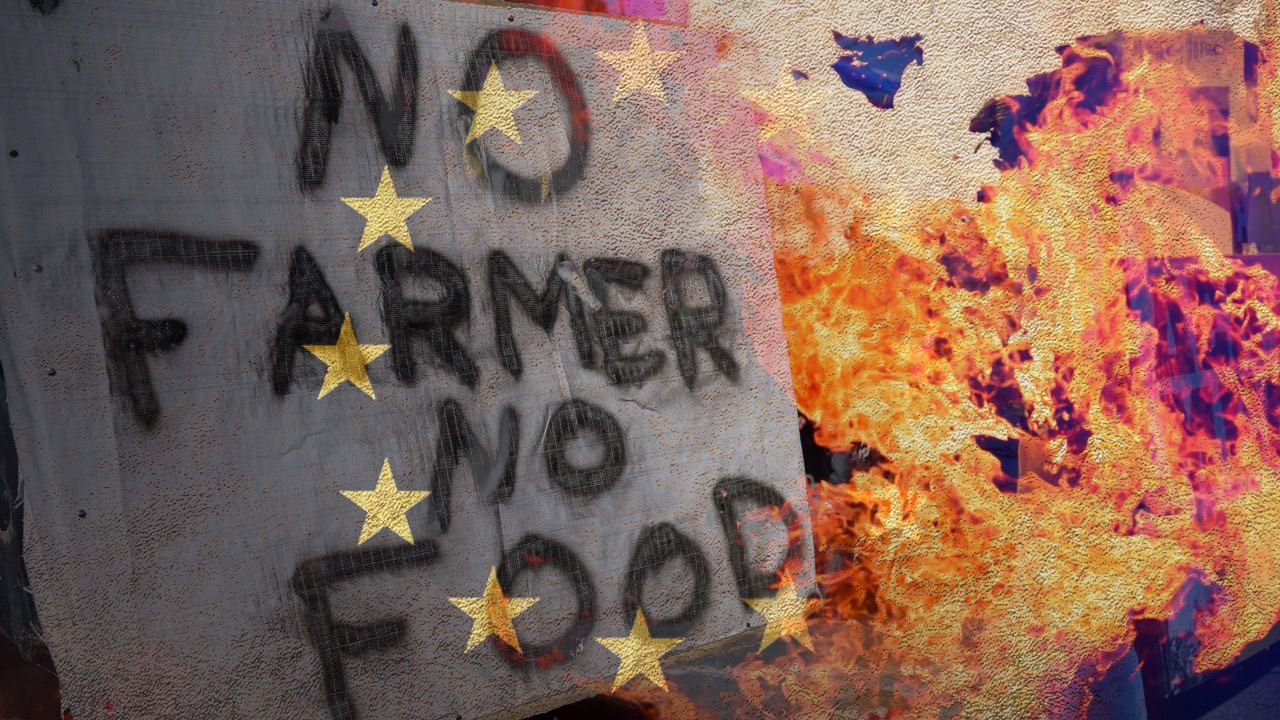By Ali Rıza Taşdelen
For almost a month, European farmers have been taking to the streets with their tractors, agricultural vehicles and machinery. Started in Germany and then spread to France and other EU countries. French farmers occupied highways with their tractors, blocking transportation for ten days, especially at the entrances to major cities such as Paris and Lyon. They piled straw and car tires in front of public buildings and in some places set them on fire. The EU Summit in Brussels was stormed by farmers.
The sanctions of the EU on Russia for nearly a decade have severely hit European farmers, among others.
Aydınlık newspaper in Türkiye had the most meaningful headline about the protests of European farmers: “European farmers’ uprising over the aids to Ukraine.” There are many reasons for farmers’ problems, but the most significant one is the sanctions of the EU on Russia. At the peak of the farmers’ protests, the EU accepted a new 50 billion aid to Ukraine.
European producers lost the Russian market
Led by the US, Western countries have been imposing economic sanctions on Russia since the Ukraine crisis in 2014. In response, Russia banned the entry of European products into the country. As a result, European producers lost their positions in the Russian market. Previously, Russia was the largest importer of European agricultural products, with Germany and Spain included, especially French agricultural products had a prominent place. The embargo of Russia on European meat and dairy products particularly affected French farmers.
In the early years of the sanctions, the surplus production of vegetables, fruits, meat, and dairy products led to a decrease in prices. The farmers who incurred losses took to the streets, similar to today, and emptied their remaining products in city centers. Over the past decade, the number of farmers who committed suicide has increased. According to the French Statistical Institute INSEE, 2-3 farmers committed suicide a day on average.
Removal of customs duties on Ukraine
Farmers having already lost the Russian market were once again hit by unfair competition when the EU removed customs duties on Ukrainian agricultural products in 2022 as a solidarity gesture. This advantage led to an influx of Ukrainian products into the EU and a decrease in prices. According to the report of the High Council on Climate (Haut Conseil pour le Climat) “20% of the beef consumed in France, and 30% to 40% of pork and poultry are imported.” International Confederation of European Beet Growers expressed concern in a statement about the sugar import, which was 20,000 tons before the war but has reached 700,000 tons now. The same goes for wheat: between 2021 and 2023, Ukraine’s wheat imports to the EU increased twentyfold. Eric Thirouin, president of the General Association of Wheat and Other Cereal Producers (AGPB), said, “We are extremely disappointed. The problem is crucial for cereals. Between 2021 and 2023, imports of Ukrainian wheat into the European Union increased twenty-fold. We went from 215,000 tonnes of wheat in 2021 to 5 million tonnes in 2023.”
Prices shoot up
As a response to Russia’s military operation in Ukraine aiming to stop NATO’s eastward expansion, the EU increased sanctions against Russia. In turn, Russia shut off the gas taps and Europe faced an unprecedented energy crisis. Gas, electricity and fuel prices doubled-tripled. The purchasing power of the working class decreased, the production costs for farmers increased, and the industry began to struggle to keep the wheels turning.
Hoping to bring Russia to its knees, Europe initiated sanctions, following the footsteps of the US. Let alone Russia’s kneeling down, we see that it has increased its exports, including Europe, and came out better off.
Germany most affected
Germany was the most dependent on Russian gas, and as a result of the sanctions against Russia, the German industry is experiencing record declines. According to the German statistical office’s report on January 9, industrial production in Germany fell by 4.8% in November 2023 compared to the same period in 2022. Energy-intensive sectors are particularly affected. Vladimir Chernov, an analyst at Freedom Finance Global, stated in an interview with Russia Today, “Following the incident with the Nord Stream gas pipelines, the cost of these raw materials has increased because they are now imported from the more expensive US and Norway. The price of hydrocarbons constitutes 20% to 40% of the cost price of some products.” With the decrease in purchasing power, demand has also declined. Factories started to close down or move to countries where energy is cheaper, the US being in the first place.
At the recent World Economic Forum in Davos, German Finance Minister Christian Lindner stated that Germany is not the “sick man” of Europe but rather a “tired man” in need of a “good cup of coffee” after the crisis of the past few years.
Europe needs Russia
Russian Deputy Prime Minister Alexey Overchuk stated in an interview with Expert magazine on 29 January: “It was not Russia that broke economic ties with Europe, and it was not Russia that began to impose sanctions” and “The sooner Europe recognizes the necessity to repair relations with Russia, the better the odds that Europeans will be able to retain their standard of living.”

















Leave a Reply